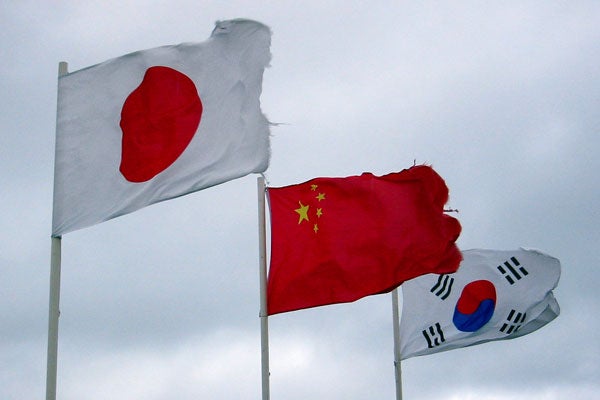|
August 22, 2014
Stanford report offers a pathway to WWII reconciliation in Asia
A Stanford report based on lingering World War II tensions between China, Japan and Korea offers a pathway to reconciliation for those countries. Suggestions include historically accurate teaching materials, history dialogues, educational forums, and scholarly and student exchanges. By Clifton B. Parker

A new Stanford report on lingering postwar tensions in Asia offers pathways for reconciliation among Japan, China and South Korea. (Photo: Future Atlas)
Improving communication and historical education are two of the major recommendations from a final report on a Stanford-hosted dialogue on World War II memories in northeast Asia.
Stanford's Walter H. Shorenstein Asia-Pacific Research Center convened a dialogue in May with experts from Asia, the United States and Europe to examine World War II reconciliation in Asia. It came at a time of heightened tensions among the governments of China, Japan and South Korea – contentious issues include territorial disputes and the way these societies portray WWII events.
"Each nation in northeast Asia and even the U.S. has selective or divided memories of the past, and does not really understand the views of the other side," said Stanford's Gi-Wook Shin, director of the Shorenstein center and a lead organizer of the event.
Stanford's two-day session was a culmination of a multi-year project that Shin and associate director Daniel Sneider organized. That effort has also yielded three books, and Shin and Sneider have another co-written volume under way on the subject. The research center is part of Stanford's Freeman Spogli Institute for International Studies.
A path to peace
The report, "Wartime History Issues in Asia: Pathways to Reconciliation," suggests the countries involved take the following steps:
- Create supplementary teaching materials: Based on Stanford's Divided Memories and Reconciliation project, supplementary curricula could highlight how the WWII period is treated in Chinese, Japanese, South Korean and American textbooks. An alternative approach would be to focus on two or three thorny WWII themes, such as the Nanjing massacre, the atomic bombing of Japanese cities and forced labor.
- Launch history dialogues: Ongoing conversations among Asian, American and European historians could highlight specific WWII events or contentious issues. The dialogue could be broadened into an international setting with more European participation.
- Offer educational forums: Public and open educational forums could be held so historians could offer various perspectives on WWII issues to journalists, policy makers and college students.
- Conduct museum exchanges: A dialogue among museum professionals in Asia and even the United States and Europe could create historically accurate narratives for those museums dealing with reconciliation issues. One idea would be to create a model museum wholly dedicated to WWII reconciliation in Asia.
- Increase student exchanges: Large-scale middle and high school student exchanges among China, Japan and South Korea could build educational and cultural bridges among these nations.
"A balanced historical education with a better understanding of the perspective of the other side is urgently needed," Shin said.
He said that for China and Korea, Japanese acts of aggression – such as the Nanjing massacre or forced labor and sexual slavery – constitute the most crucial element in their colonial and wartime memories.
"Korea and China are a less significant element in Japan's memories, while Japan looms large in theirs," said Shin.
For Japan, Shin added, U.S. actions such as the fire-bombings of Japanese cities or the nuclear attacks on Hiroshima and Nagasaki are more important.
Europe provides a model
Scholars from China, Japan, South Korea, Europe and the United States, including Stanford University faculty members, participated in the conference. Most of them have significant experience on reconciling wartime history issues.
Because WWII reconciliation in Europe has been largely successful, scholars from that continent were an integral part of the Stanford talks. In particular, Germany has engaged in robust history textbook revisions and exchanges with France, Poland and other countries.
Along with the Shorenstein Asia-Pacific Research Center, the Stanford dialogue was co-sponsored by the Trilateral Cooperation Secretariat, an international organization in Seoul established by the governments of China, Japan and South Korea in 2011 to promote peace and prosperity.
Shin said that governments and civil organizations alike should work together to bring about healing and reconciliation necessary for peace and prosperity in Asia. The media and political leadership can play important roles.
"Reconciliation will also benefit the U.S., which has huge interests in the region," he added.
The rise of nationalism among youth in China, Japan and South Korea is dangerous, the report stated: "Dialogue among youth of the different nations is needed, along with an appreciation for the diversity of views and the complexity of history."
"The Stanford dialogue could launch a new effort to resolve wartime history issues in the region," according to the report.
For more Stanford experts on international relations and other topics, visit Stanford Experts.
-30-
|